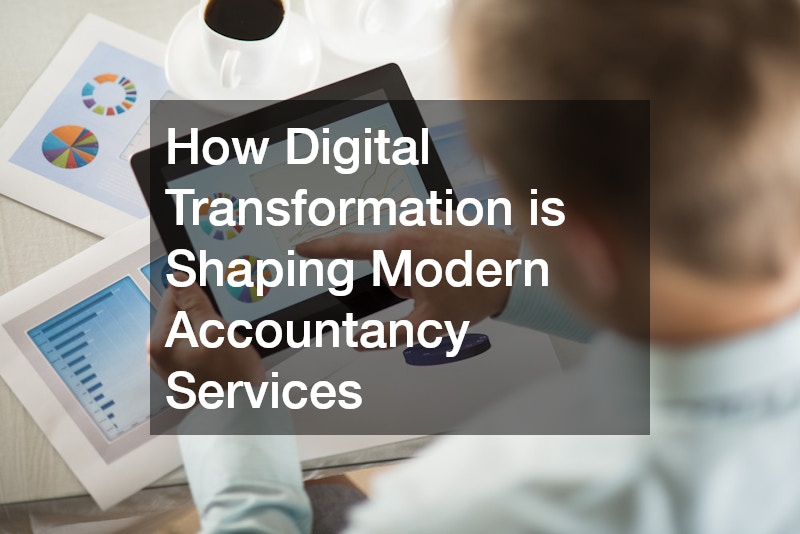
Digital transformation is rapidly reshaping industries across the globe, and accountancy services are no exception. As businesses embrace new technologies, accounting professionals are adapting to meet the evolving needs of their clients. From automation to cloud-based solutions, the modern financial accountant must be equipped with the tools and knowledge to navigate this digital landscape.
In this article, we explore how digital transformation is revolutionizing accountancy services and the key trends shaping the future of the profession.
Automation and Efficiency in Accounting
One of the most significant impacts of digital transformation in accountancy services is the rise of automation. Routine tasks that once required manual effort, such as data entry, reconciliations, and invoice processing, can now be handled by software with minimal human intervention. This shift has not only improved efficiency but also reduced the risk of human error.
Automation allows financial accountants to focus on higher-value tasks, such as analyzing financial data, providing strategic advice, and helping businesses make informed decisions. With automation handling the mundane, accounting professionals can allocate more time to client engagement and business growth strategies.
Additionally, automation is streamlining tax preparation and compliance. Tax software solutions powered by AI can track changes in tax regulations and ensure accurate filings. These tools help businesses avoid costly mistakes and maintain compliance with ever-changing laws.
The Role of Cloud Accounting
Cloud computing is another driving force behind the transformation of accountancy services. Cloud-based accounting platforms, such as QuickBooks Online, Xero, and Sage, have revolutionized how businesses manage their finances. These platforms allow financial data to be stored securely in the cloud, accessible from anywhere with an internet connection.
For businesses and financial accountants, cloud accounting offers several advantages:
Real-Time Collaboration: Cloud accounting enables real-time collaboration between accountants and clients. Both parties can access up-to-date financial information simultaneously, facilitating faster decision-making and reducing the need for back-and-forth communication.
Enhanced Security: Storing financial data in the cloud provides a higher level of security compared to traditional on-premise systems. Cloud platforms invest in robust encryption and cybersecurity measures to protect sensitive data from breaches and cyberattacks.
Cost Savings: Cloud accounting eliminates the need for expensive hardware and IT infrastructure. Businesses can save on upfront costs by subscribing to cloud services and only paying for what they use.
Scalability: As businesses grow, their accounting needs evolve. Cloud platforms offer scalability, allowing companies to add features and services as needed without the hassle of upgrading software or hardware.
These benefits have made cloud accounting an essential tool for modern businesses, giving financial accountants the flexibility and tools to offer enhanced services.
AI and Data Analytics in Accounting
Artificial intelligence (AI) and data analytics are rapidly transforming how accountancy services are delivered. AI-driven tools can analyze vast amounts of financial data, identify trends, and predict future financial performance. These capabilities enable financial accountants to offer data-driven insights that can help businesses make informed decisions about budgeting, investment, and growth.
AI also enhances fraud detection by analyzing transactional data for anomalies and patterns that may indicate fraudulent activity. Financial accountants can leverage these insights to proactively address potential issues before they become serious problems.
In addition, data analytics tools can streamline audits by providing detailed reports on financial performance, identifying discrepancies, and reducing the time it takes to conduct thorough audits. By automating audit processes, businesses can ensure accuracy while reducing costs.
The Rise of Remote Work and Virtual Accountancy
The COVID-19 pandemic accelerated the shift towards remote work, and the accountancy profession was no exception. Digital transformation has enabled financial accountants to work remotely, offering virtual accountancy services to clients worldwide. This shift has broadened the scope of accountancy services, allowing firms to reach a global client base without the need for physical office space.
Remote work has also increased the demand for digital tools that facilitate communication and collaboration. Video conferencing, project management software, and secure file-sharing platforms have become essential for accountants working with clients in different locations.
For clients, virtual accountancy services offer convenience and flexibility. Businesses can access expert advice without the need for in-person meetings, allowing them to make timely financial decisions regardless of location.
Blockchain and the Future of Accounting
Blockchain technology, originally developed for cryptocurrencies like Bitcoin, is also making its way into the world of accounting. Blockchain offers a decentralized and transparent way to record financial transactions, which can reduce the risk of fraud and errors.
In the context of accountancy services, blockchain has the potential to revolutionize auditing and financial reporting. By creating a secure, tamper-proof ledger of transactions, blockchain technology can streamline audit processes and increase transparency for businesses and regulators alike.
While blockchain adoption in accounting is still in its early stages, its potential to enhance security and accuracy makes it a promising tool for the future of financial accountancy.
Challenges and Opportunities
While digital transformation brings numerous benefits to accountancy services, it also presents challenges. One major concern is the need for continuous learning and upskilling. Financial accountants must stay up-to-date with the latest technologies and tools to remain competitive in the industry.
Additionally, the increased reliance on digital tools raises concerns about data privacy and security. Accountants and businesses must ensure that they comply with regulations and implement robust cybersecurity measures to protect sensitive financial information.
Despite these challenges, digital transformation offers significant opportunities for growth and innovation in the accounting profession. Accountants who embrace new technologies and adapt to changing client needs will be well-positioned to thrive in the digital era.
Conclusion
Digital transformation is reshaping the landscape of accountancy services, offering new opportunities for efficiency, accuracy, and client engagement. From automation and AI to cloud accounting and blockchain, the modern financial accountant must navigate a rapidly evolving technological landscape. While challenges such as data security and the need for continuous learning remain, the benefits of digital transformation are clear. By embracing these advancements, accountants can offer enhanced services that meet the demands of a dynamic and ever-changing business environment.
.




